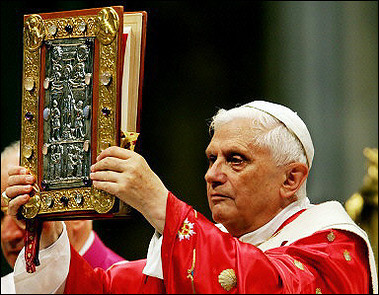
A very interesting article in the NY Times Magazine about Pope Benedict. It is trenchant in its analysis of the issues at play in Western culture, and in this Pope's thinking about those issues. It ends, however, with a hackneyed and jejune implication: that if the Catholic Church would just soften its moral teachings, it would be better positioned to speak to people in contemporary culture. The article quotes Fr Keith Pecklers (professor at the Gregorian): "On Sunday mornings, the people in the pews, in Europe or America, are very often divorced or gay or are using birth control. Or else they’re not in the pews; they’ve left the church." It then concludes by quoting Fr Reese (SJ), the editor of America, who was suspended from his post for allowing too much theological latitude in his journal: "Think of the silencing of theologians in recent decades... The suppression of discussion and debate. How certain issues become litmus tests for orthodoxy and loyalty. All of these make it very difficult to do the very thing Benedict wants" -- i.e. to reinject Christianity into Western culture.
It seems to me that ECUSA's efforts over the last thirty or forty years unquestionably belie that implication. Even if it were possible to make the moral teachings of the Church more palatable to contemporary mores, ECUSA's pathetic membership slide illustrates that such palatability doesn't translate into some kind of renewed interest in Christianity among those who have left the Church. It just tells them that the Church is realizing institutionally what secular folk came to believe decades, if not centuries, ago: that the Church was wrong all along.
But a softening of the Church's moral teaching is not possible to begin with: it is what it is. ECUSA's hierarchs are chasing a delusion born in the minds of people who came of age in the 1960's. They are the offspring of a curious romantic reaction to cold Enlightenment rationality, who have adopted the idiom of postmodernity for convenience, but who are thereby left with nothing to preach but weird platitudes ("God / Goddess loves you").
Catholic moral doctrine is an outgrowth of (and secondary to) catholic Christianity's sacramental ontology. We can't abandon our moral teachings without abandoning very fundamental truths about what is going on in the cosmos -- about God's love for his creation. And if you abandon the latter, then you have become secular or pagan (cf. ECUSA).
Anyway, here are some choice snippets from the NY Times Magazine article:
Sociologists and even some church officials routinely apply the term “post-Christian” to Europe or parts thereof. Spain is still deeply Catholic in its cultural identity, yet polls show half the country “almost never” attends Mass, and the government has defied the church in legalizing same-sex marriage and making abortion easier to obtain. A recent survey of the Church of England by researchers at the University of Wales showed that only 60 percent of its clergy believe in the virgin birth of Jesus, and 1 out of 33 Anglican priests doubts the existence of God.
....
“While Europe once was the Christian Continent, it was also the birthplace of that new scientific rationality which has given us both enormous possibilities and enormous menaces. . . . In the wake of this form of rationality, Europe has developed a culture that, in a manner hitherto unknown to mankind, excludes God from public awareness. . . . A culture has developed in Europe that is the most radical contradiction not only of Christianity but of all the religious and moral traditions of humanity.”
....
Or consider that after I attended the nearly empty Christmas season Mass at Sopra Minerva in Rome, I strolled a few hundred yards away, just across the Tiber, to find a radically different spectacle. The Basilica of Santa Maria in Trastevere is just as ancient and just as packed with icons that are featured in art-history texts as Sopra Minerva. Here 300 people filled the pews, as is more or less the case seven nights a week at 8:30 p.m. They were mostly in their 20s to 40s, most seemed to be professionals, a group both well shod and featuring some extreme eyewear. The setting couldn’t have been more Catholic, and yet it wasn’t a Mass that was taking place. No priest officiated; there was no Communion offered, no body and blood of Christ. It was an energetic, soulful lay service, a 30-minute meditation — a well-orchestrated mix of prayer and song on a spot where Christians have celebrated their rites since around 300 A.D., conducted by and for ordinary people. Precisely at 9 o’clock it ended; people gathered into clusters and chatted briefly and then everyone headed into the night.

4 comments:
Amen, Fr.
Your analysis of the article and the comparison with what has happened in ECUSA is excellent.
Trackback,
I recommend...
http://anglicancontinuum.blogspot.com/2007/04/keeping-faith-and-losing-it.html
When the Son of Man returns, will He find faith?
Post a Comment